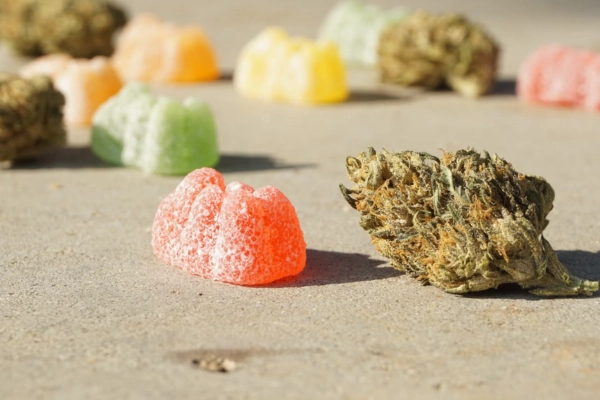The Sleep Crisis Nobody Talks About at the Doctor’s Office
Seventy million Americans have a chronic sleep disorder. Another 30% report occasional insomnia. Most of them have tried melatonin. A lot have tried prescription sleep aids — and then spent a year trying to get off them.
The ones who’ve found THC and CBN sleep gummies largely aren’t talking about it at their annual checkup. But they’re buying these edibles for sleep in record numbers, and they’re coming back for more.
We’ve been selling hemp-derived cannabinoids at D8Austin since before the hemp boom, and sleep is now the single most common reason customers walk through our door or land on our site. They’re not looking to get high. They’re looking for four uninterrupted hours to become eight. They want to stop waking up at 3 am with their mind already running. They want to fall asleep without lying there for two hours first.
This guide covers what’s actually working — the cannabinoids, the doses, the formats, and the specific products we’ve personally vetted across our inventory of 750+ items. No filler brands. Just what’s working for the people buying it.
Table of Contents:
- The Sleep Crisis Nobody Talks About at the Doctor’s Office
- New to Hemp Sleep Products? Read This First
- 2026 Quick-Reference: Best Edibles for Sleep
- Why Cannabis Gummies for Sleep Work When Melatonin Doesn’t
- Is CBN Stronger Than Melatonin for Sleep?
- The Formats That Work (And One That Doesn’t)
- Delta 9 Gummies for Sleep: How Much Should You Take?
- The Best THC Gummies for Sleep: D8Austin’s 2026 Picks
- How to Match the Right Gummy to Your Specific Sleep Problem
- How to Read a Certificate of Analysis for Sleep Gummies
- THC + CBN Sleep Gummies vs. Prescription Sleep Aids: An Honest Comparison
- Frequently Asked Questions
- Where to Buy Cannabis Sleep Gummies You Can Actually Trust
- The Bottom Line
New to Hemp Sleep Products? Read This First
If you’ve never used hemp-derived cannabinoids before, here’s what you need to know before scrolling further.
The cannabis sleep edibles on this page are not dispensary products. They’re hemp-derived, federally legal, and available without a cannabis card. Some contain small amounts of THC, and some contain zero THC whatsoever.
Will they make you feel “high”? That depends entirely on which product you choose and how much you take. A low-dose Delta-9 gummy (5–10mg) produces noticeable relaxation that most users don’t describe as intoxicating in the recreational sense. A CBN-dominant product feels more like a mild sedative than a high. And the THC-free options on this list — which use only CBD and CBN — produce no psychoactive effect at any dose.
We’ve included recommendations across the full spectrum, from completely non-psychoactive to noticeably potent, so you can find your starting point wherever you are.
In a hurry? Jump straight to our 2026 picks or keep reading for the full breakdown of what to look for, how to dose, and which formulas work for which sleep problems.
2026 Quick-Reference: Best Edibles for Sleep
| Product | Cannabinoids | Best For | Psychoactive? |
| 3CHI True Strain Gummies | 40+ cannabinoid blend | Experienced users, full-spectrum | Yes |
| MoonWlkr CBD+CBN+THC Sleep Gummies | 25mg CBD / 10mg CBN / 5mg D9 | Anxiety-driven insomnia | Mildly |
| MoonWlkr CBD+CBN Mixed Berry | 25mg CBD / 10mg CBN | Zero THC, daily wind-down | No |
| Erth Wellness CBN+THC Sleep+ Gummies | 20mg CBN / 5mg THC / 1.5mg melatonin | 3 am wake cycle, sleep maintenance | Mildly |
| Urb Restful Botanically Infused Gummies | CBD+CBN+D9+Chamomile+L-Theanine+Melatonin | Nothing else has worked | Mildly |
| Erth Wellness THC-Free Stress Gummies | 50mg broad-spectrum CBD+CBG+CBN | Strict zero-THC requirement | No |
| Mellow Fellow Live Resin M-Fusions | Delta-9 THC + CBD, Live Resin | Repeat buyers, flavor + consistency | Yes |
Why Cannabis Gummies for Sleep Work When Melatonin Doesn’t
Before diving into products, it helps to understand why cannabinoid sleep gummies work when melatonin often doesn’t — this context will help you pick the right product for your specific sleep problem.
Melatonin signals your brain that it’s nighttime. That’s its only job. It does nothing for anxiety-driven wakefulness, nothing for physical restlessness, and nothing for the early-morning wake cycle that plagues so many adults over 40. If your problem is that you feel wide awake at bedtime even when you’re exhausted, melatonin is pointing at a problem it wasn’t designed to solve.
THC (whether Delta-9 or Delta-8) reduces sleep latency — the time it takes to fall asleep — and increases time spent in deep, slow-wave sleep. It also suppresses REM sleep, which is why long-term heavy users sometimes report not dreaming. For most occasional users, this is the desired outcome: less dreaming typically means less REM disruption and fewer middle-of-the-night waking periods.
CBN (cannabinol) is a mildly psychoactive cannabinoid produced as THC ages and oxidizes. It’s developed a strong reputation as a sleep aid — particularly for its sedative-adjacent effects at moderate doses. The research is still early, but the market signal is hard to ignore: products with THC+CBN formulations outsell single-cannabinoid sleep gummies significantly, and their repeat purchase rates are among the highest in our store.
Browse our full CBN edibles selection
CBD plays a supporting role in many formulations. It doesn’t produce sleep on its own at typical doses, but it’s anxiolytic — it reduces the racing thoughts that keep people awake. Many effective delta 9 gummies for sleep use a Delta-9+CBD+CBN triple-stack for exactly this reason.
The bottom line: the right cannabinoid sleep gummy doesn’t just signal sleep — it addresses the actual reason you’re not sleeping, whether that’s anxiety, physical restlessness, or an inability to stay asleep once you get there.

Is CBN Stronger Than Melatonin for Sleep?
This is one of the most common questions we get, and the answer depends on what your sleep problem actually is.
For circadian rhythm issues — jet lag, shift work, adjusting to a new schedule — melatonin is targeted and effective. It’s the right tool for that specific job.
For everything else — anxiety at bedtime, early-morning waking, physical restlessness, difficulty staying asleep — CBN addresses mechanisms that melatonin was never designed to touch. They work through entirely different pathways in your body.
In practice, the customers who switch from melatonin to a CBN-based sleep gummy and come back for a second bottle aren’t doing it because of clever marketing. They’re doing it because something finally worked. The most effective products in this category combine both — using melatonin for circadian signaling and THC+CBN for the deeper sleep architecture work that melatonin can’t do on its own. The Erth Wellness Sleep+ and Urb Restful Gummies below both take this approach.
The Formats That Work (And One That Doesn’t)
THC + CBN blends are the current gold standard for sleep. CBN amplifies and extends the sedative quality of THC without significantly increasing psychoactivity. If you want to stay asleep, this is the combination the market has converged on.
THC + CBD + CBN triple-stack gummies add an anxiolytic layer that’s particularly valuable for anxiety-driven sleeplessness. If your brain won’t quiet at bedtime, this format often outperforms a pure THC+CBN product.
THC-free CBN + CBD gummies are the right choice for anyone who wants sleep support without any psychoactive effects. No high, no impairment risk, no morning grogginess ceiling. Ideal for people who are drug-tested, THC-sensitive, or simply prefer a non-intoxicating option.
Melatonin-enhanced THC+CBN gummies address multiple sleep mechanisms simultaneously — endocannabinoid activation through THC+CBN plus the circadian melatonin signal. These tend to produce the fastest sleep onset in the category.
What doesn’t work for sleep: High-THCP gummies, blends marketed as daytime or euphoric, anything labeled “energizing,” “uplifting,” or “cerebral.” If the label suggests daytime use, it’s not a sleep product.
Delta 9 Gummies for Sleep: How Much Should You Take?
Dosing for sleep is different from daytime dosing. At night, you can afford a product with a stronger sedative profile, and the consequences of overshooting — waking up groggy — are more manageable than they’d be during the day.
That said, start conservatively on your first night, especially if you’re new to THC edibles. Edibles are metabolized through your liver and converted to 11-hydroxy-THC, which is more potent and longer-lasting than inhaled THC. A dose that feels mild at 45 minutes can feel substantial at 90 minutes on an empty stomach.
| Experience Level | Recommended Dose | Expected Effect |
| Beginners / THC-naive | 5mg Delta-9 or 10mg Delta-8 | Gentle relaxation, reduced sleep latency |
| Occasional users | 10–15mg Delta-9 or 10mg D9 + 5mg CBN | Clear sedation, extended sleep |
| Regular users | 25mg+ Delta-9 or THC+CBN blend (25mg / 10–15mg CBN) | Strong, long-lasting sleep support |
The one rule that matters most: Take your gummy, then stop thinking about it. Clock-watching every 20 minutes is the single most common reason edibles “don’t work.” Take it, do something relaxing, and let it find you.
Absorption tip: Take your delta 9 sleep gummy with a light fatty snack — peanut butter, a small piece of cheese, or a handful of nuts. Fats enhance cannabinoid bioavailability and produce a more consistent onset. Onset typically runs 45–90 minutes on a partially full stomach, 60–120 minutes after a full meal.
For delta 8 gummies for sleep specifically: Delta-8 runs roughly 50–70% the potency of Delta-9, so a dose slightly higher, 15–20mg, is a typical starting point for occasional users. The trade-off is a smoother, less anxiety-prone experience that many first-timers prefer.
The Best THC Gummies for Sleep: D8Austin’s 2026 Picks
These are products from our current in-stock inventory — chosen because of high reorder rates, verified customer satisfaction, and formulations built specifically for sleep.

Best Overall: 3CHI True Strain Gummies
Cannabinoids: Proprietary blend of 40+ cannabinoids, strain-specific profiles
Potency Options: 15mg / 64mg / 100mg per gummy
3CHI has set the standard in hemp-derived cannabinoids since the early days of the category, and the True Strain Gummies are their most sophisticated sleep formulation yet. The proprietary blend of over 40 cannabinoids replicates the full-spectrum effect profile of specific cannabis strains — meaning the deep relaxation and sleep-supportive properties of a quality indica are built into the formula rather than approximated with a single cannabinoid.
Three potency tiers make these the most versatile cannabis gummies for sleep in our inventory. The 15mg tier works for occasional users, 64mg for regular users, 100mg for high-tolerance customers who’ve found other products underwhelming. Start with ¼ of a gummy on your first night regardless of experience level — the multi-cannabinoid complexity has a higher ceiling than it looks on the label.
Best for: Experienced THC users who’ve plateaued on simpler formulas. Anyone who wants strain-accurate effects from their sleep edibles.

Best Triple-Stack for Anxiety-Driven Insomnia: MoonWlkr CBD, CBN & THC Sleep Gummies
Cannabinoids: 25mg CBD + 10mg CBN + 5mg Delta-9 THC per gummy
Shop MoonWlkr CBD, CBN & THC Sleep Gummies
If you fall into bed exhausted and your brain immediately starts running through tomorrow’s to-do list — this is the product. The 5:2:1 CBD-to-CBN-to-THC ratio is deliberate: CBD handles the anxious mental state, CBN extends the sleep window, and the Delta-9 delivers actual sleep onset. All three mechanisms work together on the same problem.
The THC dose (5mg per gummy) is low enough that most first-time users describe the effect as “relaxed and ready for sleep” rather than “high.” It’s one of our most consistently reordered sleep products, particularly among customers who switched from CBD-only options and were underwhelmed.
Best for: Racing thoughts at bedtime, anxiety-driven sleeplessness, CBD-experienced users ready for the next step up, first-timers who want THC with a safety net.

Best Zero-THC Option: MoonWlkr CBD + CBN Sleep Gummies Mixed Berry
Cannabinoids: 25mg CBD + 10mg CBN per gummy | Zero THC
Shop MoonWlkr CBD + CBN Sleep Gummies
For customers seeking genuine sleep support without psychoactive effects, this is our top recommendation. No THC, no high, no risk of morning grogginess from overconsumption — just 25mg CBD and 10mg CBN in a mixed berry gummy you can take nightly without any concern about impairment.
These are not just a CBD gummy with branding. The CBN component does real work here — particularly for the middle-of-the-night waking that CBD alone tends not to address. If you’ve tried CBD sleep gummies and found them underwhelming, this is the next honest step before adding THC.
Best for: Professional drug-testing situations, THC-sensitive individuals, seniors new to cannabinoids, parents who want nothing psychoactive in the house, light sleepers building a consistent nightly routine.

Best Clinically-Formulated Sleep Gummy: Erth Wellness CBN + THC Live Resin Sleep+ Gummies
Cannabinoids: 20mg CBN + 5mg THC + 1.5mg melatonin per gummy | Live Resin Terpenes
Shop Erth Wellness Sleep+ Gummies
Three mechanisms, one gummy. CBN and THC work through the endocannabinoid system for sedation and sleep maintenance. Melatonin handles the circadian signal. Most sleep edibles choose one or two of these levers — Erth Wellness pulls all three simultaneously.
The CBN-heavy ratio (20mg CBN vs. only 5mg THC) means this leans sedative rather than psychoactive. Most users don’t describe it as “feeling high” — they describe it as “feeling heavy and ready for sleep.” The live resin terpene profile enhances the therapeutic depth of each cannabinoid through the entourage effect.
Suggested use is 1–2 gummies 30–60 minutes before bedtime. For customers with early-morning wake patterns (waking at 4–5 am and unable to get back to sleep), we’ve found that taking two gummies earlier in the evening — 8 pm rather than 10 pm — extends the sleep window more reliably into the morning hours.
Best for: Sleep maintenance issues, the 3 am wake cycle, customers who want a CBN-dominant formula over a THC-dominant one, and anyone whose primary problem is staying asleep rather than falling asleep.

Best Comprehensive Wind-Down Formula: Urb Botanically Infused Restful Gummies
Cannabinoids: CBD + CBN + Delta-9 THC + Chamomile + L-Theanine + Melatonin | 1875mg total
The most complete wind-down formula we carry. Beyond the cannabinoid stack, Urb has added chamomile and L-theanine — both with legitimate evidence behind them for anxiety reduction and sleep quality — alongside melatonin for circadian support.
That’s five distinct sleep mechanisms in a single gummy: endocannabinoid activation via THC and CBN, anxiety reduction via CBD and L-theanine, botanical calming via chamomile, and circadian signaling via melatonin. For customers who’ve tried multiple cannabis sleep edibles without success, this multi-pathway approach often succeeds where single-mechanism products couldn’t.
The flavor profile — Elderberry, Blueberry, Marionberry, Kaffir Plum — is genuinely enjoyable. Building a nightly sleep routine is easier when the gummy itself is something you look forward to.
Best for: Customers who’ve tried multiple sleep products and been disappointed. Anyone who wants botanical support alongside cannabinoids. Comprehensive wind-down routines. The “kitchen-sink” buyer who wants maximum coverage.

Best Strict Zero-THC Option: Erth Wellness THC-Free Stress Gummies 1500mg
Cannabinoids: 50mg broad-spectrum CBD + CBG + CBN per gummy | Zero THC | ISO 17025 certified
Shop Erth Wellness Stress Gummies
At 50mg CBD per gummy with CBG and CBN included, this is the highest-dose non-psychoactive cannabinoid sleep product in our inventory. An additional purification process brings THC to below 0.00% — not just “under 0.3%,” but genuinely undetectable. ISO 17025 lab certification means the testing methodology is independently validated, not just internally claimed.
For customers who need a guaranteed zero-THC result — federal employees, military personnel, competitive athletes, CDL holders — this is the product to recommend. The 50mg broad-spectrum dose provides a meaningful therapeutic effect even without THC. Vegan, juicy orange flavor, 30 gummies per jar.
Best for: Any situation where zero-THC is non-negotiable. High-dose CBD seekers. Professional drug testing with no tolerance for risk. Customers who want pharmaceutical-grade testing standards behind their purchase.

Best Repeat-Buy Pick: Mellow Fellow Live Resin M-Fusions Edibles
Cannabinoids: Delta-9 THC + CBD | Live Resin | 1000mg
Here’s the truth: Mellow Fellow M-Fusions have one of the highest reorder rates in our entire edibles category. Customers don’t just buy these once — they come back for them specifically by name. In a market with hundreds of Delta 9 gummies for sleep, that kind of loyalty tells you something about consistency that no product description can.
The Live Resin extraction process — using flash-frozen hemp rather than dried and cured material — preserves a broader terpene profile than distillate-based gummies. This produces a more nuanced effect at comparable potency levels, and it’s why experienced users who’ve had disappointing experiences with standard D9 gummies often find these hit differently. Formulated by PhD pharmacists. Taste excellent. Consistent batch to batch.
If you want a delta 9 sleep gummy that you’ll actually enjoy taking every night rather than treating it as medicine, this is the answer.
Best for: Flavor-forward buyers who’ve been disappointed by bad-tasting gummies. Repeat buyers are building a sustainable nightly routine. Anyone who wants live resin quality in a D9+CBD sleep edible.
How to Match the Right Gummy to Your Specific Sleep Problem
You can’t fall asleep (sleep onset insomnia): Any THC-containing product will help. Delta-9 gummies produce the fastest onset. Start with MoonWlkr CBD+CBN+THC or Mellow Fellow M-Fusions.
You fall asleep fine, but wake in the night: This is the CBN use case. Erth Wellness Sleep+ (CBN-dominant with melatonin) and Urb Restful (full multi-ingredient stack) are built for this.
Your mind races and won’t quiet down: MoonWlkr CBD+CBN+THC — the CBD specifically addresses the anxious mental state that keeps anxiety-prone sleepers awake. Alternatively, the Erth Wellness Stress Gummies offer a zero-THC version of this approach.
You need absolute zero-THC: MoonWlkr CBD+CBN Mixed Berry for sleep-specific CBN support. Erth Wellness Stress Gummies for the highest CBD dose with professional-grade certification.
Nothing has worked: Urb Restful Gummies for the most comprehensive formula, or 3CHI True Strain for full-spectrum cannabinoid depth. Start with half the suggested dose and assess before committing to a full portion.
How to Read a Certificate of Analysis for Sleep Gummies
Every product we carry at D8Austin comes with a third-party Certificate of Analysis (COA). For sleep products specifically, this matters more than in almost any other category because:
Dosing precision is everything. A gummy labeled 10mg Delta-9 that actually contains 6mg won’t produce the sleep effect you’re expecting. One containing 16mg may be more intense than intended — and more likely to cause morning grogginess.
CBN content must be verified. CBN is more expensive to produce than THC, which creates a real incentive for underdosing without disclosure. A COA shows you exactly how much CBN is in each gummy versus what the label claims.
Contaminant testing protects your health. Quality COAs test for heavy metals, pesticides, residual solvents, and microbial contamination. For a product you’re taking nightly, this is non-negotiable.
All lab reports for products we carry are available via our COA verification system. If a product doesn’t have a current COA — issued within the past 12 months — don’t buy it from anyone.
THC + CBN Sleep Gummies vs. Prescription Sleep Aids: An Honest Comparison
We’re not doctors, and this isn’t medical advice — but the comparison comes up enough that it’s worth addressing honestly.
Common prescription sleep aids (zolpidem, eszopiclone) work by enhancing GABA activity in the brain, sedating the central nervous system. They’re effective at inducing sleep but carry a real side effect profile: dependency risk, rebound insomnia when stopping, daytime grogginess, and in some cases, parasomnias — sleepwalking, sleep-eating, and other unconscious behaviors.
THC and CBN work through the endocannabinoid system differently and in the risk profile. Cannabinoid sleep aids don’t carry the pharmacological dependency risk of benzodiazepines or z-drugs, and they don’t produce dangerous parasomnias. The primary risks are psychological habit formation with daily use, grogginess from overdosing, and, in rare individuals, increased anxiety from THC.
If you’re currently on prescription sleep medication, do not stop taking it to switch to gummies without talking to your prescriber first. Some medications have withdrawal effects that require medical management. Use this information to have a better conversation with your doctor — not to make a unilateral decision.
Frequently Asked Questions
Will THC sleep gummies make me feel high?
It depends on the product and dose. Low-dose Delta-9 gummies (5–10mg) and CBN-dominant formulations like the Erth Wellness Sleep+ produce noticeable relaxation that most users don’t describe as “high” in a recreational sense. At moderate doses (15–25mg), Delta-9 produces a more noticeable psychoactive effect that experienced users recognize as typical of cannabis edibles.
If you want zero psychoactive effect at any dose, the MoonWlkr CBD+CBN Mixed Berry and Erth Wellness Stress Gummies are completely THC-free and produce no intoxication. These are the right starting points if you’re THC-hesitant.
Which is better for sleep, melatonin or THC gummies?
Melatonin is specifically designed to regulate circadian rhythm. It’s the right tool for jet lag, shift work, and adjusting to a new sleep schedule. For everything else — anxiety at bedtime, difficulty staying asleep, early-morning waking — cannabinoids address mechanisms that melatonin was never designed for.
In practice, the most effective sleep gummies combine both. Products like the Erth Wellness Sleep+ (1.5mg melatonin + 20mg CBN + 5mg THC) and the Urb Restful Gummies use melatonin for its specific circadian role while letting THC and CBN handle the deeper sleep architecture work. If you’ve been using melatonin and it hasn’t solved your sleep problem, the question worth asking is: what’s the actual reason you’re not sleeping?
Do CBN gummies work for sleep?
Yes — and for specific reasons. CBN appears to extend the total sleep window and reduce nighttime waking more than it accelerates sleep onset. This makes it particularly effective for the 3 am wake pattern that many adults experience.
CBN performs better in combination with THC than it does alone (the entourage effect), which is why the best CBN sleep gummies pair the two rather than relying on CBN as the sole active ingredient. Our CBN-containing recommendations include the Erth Wellness Sleep+, MoonWlkr CBD+CBN+THC, MoonWlkr Mixed Berry (THC-free), and Urb Restful Gummies.
For a full selection of CBN-containing products:
Browse our CBN edibles category
What is the best mg of THC for sleep?
For most people new to cannabis edibles for sleep, 5–10mg of Delta-9 THC is the right starting dose. This produces meaningful sleep support without an overwhelming effect.
For regular cannabis users with established tolerance, 15–25mg is the more common effective range. For high-tolerance users who’ve found lower doses insufficient, products like the 3CHI True Strain Gummies offer 64mg and 100mg tiers.
The more useful framing: the right dose is the minimum amount that helps you fall and stay asleep without producing next-morning grogginess. Start conservative, assess, and adjust upward if needed.
Will I feel groggy the next morning?
Grogginess is almost always a dose and timing issue rather than a product quality issue.
If you’re consistently waking up groggy:
- Reduce your dose by half first — this solves it most of the time
- Take the gummy earlier — 8 pm instead of 10 pm gives the THC more time to clear before your alarm
- Choose a CBN-dominant product — the Erth Wellness Sleep+ (20mg CBN / 5mg THC) produces less next-day sedation than higher-THC options
- Try a THC-free option — MoonWlkr CBD+CBN Mixed Berry or Erth Wellness Stress Gummies have essentially zero grogginess ceiling
The products least likely to produce morning grogginess, in order: MoonWlkr CBD+CBN Mixed Berry (THC-free), Erth Wellness Stress Gummies (THC-free), Erth Wellness Sleep+ (CBN-dominant with minimal THC), MoonWlkr CBD+CBN+THC (low 5mg D9 dose).
Can I take THC sleep gummies every night?
Daily users do build tolerance over time, which is why taking one or two nights off per week helps maintain effectiveness. This is sometimes called a tolerance break, and it doesn’t require long periods — even a single off-night per week makes a meaningful difference.
Unlike prescription sleep aids, there’s no pharmacological dependency risk from cannabinoids. Psychological habit formation is real and worth being mindful of, but there’s no withdrawal effect and no escalating chemical dependency.
Will THC sleep gummies show up on a drug test?
Yes. Hemp-derived Delta-9, Delta-8, and all THC variants metabolize to THC-COOH — the compound standard drug tests screen for. If you have an upcoming employment, legal, or athletic drug test, do not use THC-containing sleep products.
For zero-THC options with a genuine safety profile for testing situations, see the MoonWlkr CBD+CBN Mixed Berry and Erth Wellness Stress Gummies. Note: CBN itself can produce a faint positive on some screens due to structural similarity to THC metabolites. If drug testing is a concern, check with your testing provider before using any cannabinoid product.
Are these products legal in Texas?
Yes. As of early 2026, hemp-derived cannabinoid products — including hemp-derived Delta-9 THC gummies — are legal to purchase and possess in Texas under the 2018 Farm Bill (≤0.3% Delta-9 THC by dry weight). All products we carry meet federal hemp compliance standards.
The regulatory environment in Texas has been dynamic. We monitor legislative developments closely and update our inventory to remain fully compliant. If you’re uncertain about a specific product’s status, our Austin store staff can answer questions in person.
What’s the difference between hemp edibles for sleep and melatonin gummies?
Melatonin signals your brain’s circadian clock that it’s nighttime. Useful for schedule adjustments. Does nothing for anxiety-driven sleeplessness, physical restlessness, or inability to stay asleep.
Hemp edibles for sleep — specifically THC+CBN combinations — interact with the endocannabinoid system to reduce sleep latency (time to fall asleep), promote deeper slow-wave sleep, and, in the case of CBN, extend the total sleep window. For adults over 40 whose natural melatonin production has declined, these products address the actual biochemistry of their sleep problems more completely than melatonin alone can.
The products that work best combine both: melatonin for its specific circadian role, plus cannabinoids for the mechanisms melatonin can’t reach.
Where to Buy Cannabis Sleep Gummies You Can Actually Trust
The online market for hemp-derived cannabinoids has a quality problem. Low barrier to entry means hundreds of brands selling products with inaccurate labels, outdated or missing lab reports, and underdosed CBN. For sleep specifically — where you’re relying on dose precision and consistent formulation — buying from a verified retailer matters.
What to look for: a current third-party COA (issued within the past 12 months) for every product, clear compliance practices, established brand relationships, and staff who can actually answer your questions.
At D8Austin, every product in our sleep category is sourced from established brands with real testing programs. You can verify lab results for any product before you buy.
Shop in Austin: 9231 W Parmer Ln, UNIT 102 — same-day access to our full sleep inventory, no shipping wait, and staff who can walk you through the options in person. If you’ve been frustrated trying to figure this out online, come see us.
Shop online: d8austin.com ships to all states where hemp-derived cannabinoids are legal.
The Bottom Line
The best sleep gummy is the one that matches your specific problem — not the most popular product or the most potent one.
- For falling asleep: MoonWlkr CBD+CBN+THC or Mellow Fellow M-Fusions
- For staying asleep: Erth Wellness Sleep+ or Urb Restful Gummies
- For anxiety at bedtime: MoonWlkr CBD+CBN+THC triple-stack
- For zero psychoactivity: MoonWlkr Mixed Berry or Erth Wellness Stress Gummies
- For maximum cannabinoid sophistication: 3CHI True Strain
Start lower than you think you need to. Take it 60–90 minutes before bed with a light snack. Give it at least three nights before adjusting. Sleep is not optional — and you don’t need to keep waking up disappointed.
Shop All Sleep Gummies | View All Lab Reports | Visit Our Austin Store
These statements have not been evaluated by the Food and Drug Administration. These products are not intended to diagnose, treat, cure, or prevent any disease or medical condition. For use by adults 21 years of age or older only. Keep out of reach of children.





